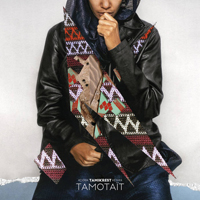
TAMIKREST
TAMOTAIT (Glitterbeat GB091CD)
Tamikrest have been compared to Can and Pink Floyd. To me that suggests nostalgia for old 70s rock, and their audience may well be geezers of my generation who find something familiar and gratifying in desert blues. This is their fifth album in a decade and it is more lyrically conscious rock 'n' roll and less go for broke blazing heavy metal than the other Tuareg albums I have heard. There are even ballads, which predominate. A lack of translation though (even of song titles) hampers my appreciation of what they are about. Tamikrest, from the Kel Tamasheq people (as they prefer to be called, rather than Tuareg) live in exile in France and Algeria. They've also picked up a French guitar player and drummer, and an Irish producer, David Odlum (grammy-winner for his work with Tinariwen). There's a fair amount of variety though the basic washing-machine thrub and drub of two-chord desert rock is to the fore in tracks like "Amidinin Tad Adouniya." On "Timtarin," an echoey ballad, a Moroccan woman singer, Hindi Zahra guests. According to the Financial Times this is a lament for extinguished youthful passions. The production suggests the band is geared towards YouTube videos more than live performance, though they certainly tour (their latest has been postponed). The cinematic style -- loads of echo, hand drums and subtle clapping and subtle washes of guitar behind breathy vocals -- peaks on "Tihoussay," another dreamy two-chord seesawing romp. While the band were in Japan they went into the studio with players of shamisen and the 5-string Japanese tonkori who embroider the tapestry of the last track, "Tabsit."
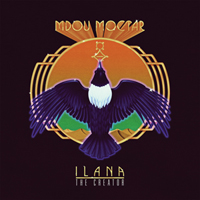
MDOU MOCTAR
ILANA THE CREATOR (Sahel Sounds)
After hearing Moctar on KEXP, via YouTube, I thought I should check out his latest album. The Tuareg blues guys from Niger seem to be either stoner Deadheads stuck in an endless version of "Casey Jones" with no bridge (since they have no water), or blazing Hendrix-inspired pyrotechnicians, and I would include Bombino and Moctar in the latter category. Growing up in a small village where music was frowned on as irreligious, M'dou made a home-made guitar and learned to play in secret. When he got his hands around a real guitar, even the village elders came around to appreciate his lyrics. He played with a drum machine and experimented with sound, even starring in the first Tuareg language film: a remake of Purple Rain! Having released one album a year for six years he now has a full backing quartet of drumkit, bass and rhythm guitar. He is still experimenting, using reverb and feedback on the 90 seconds of "Inizgam." Mostly he just blazes and makes you wonder how inferior acts like Joe Bonamassa get such a big reputation and TV specials. Check out his live track "Tarhatazed." Light the blue touch paper and stand back for fireworks.
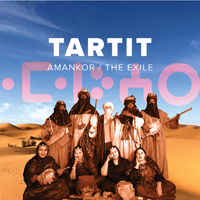
TARTIT
AMANKOR / THE EXILE (Riverboat Records TUGDD1120)
Over a decade ago Tartit was one of a flurry of desert nomad bands, Touregs in exile, who made a splash with the combination of complaining vocals and Grateful dead-like guitar dirges rambling on endlessly. Some, like Bombino, went from Nomads to Womads and others were forgotten; the women of Tartit did not forget, however they were unable to get together again and continued struggling to survive against the odds in strife-torn Mali. In addition to the aforementioned electric guitars, they add other traditional instruments such as the teherdent (three-stringed ngoni), flute, imzad (fiddle, made of horsehair with a gourd resonator) and the tindé (hand-drum). Still in exile, they sing of their love for their home in Timbuktu far across the Sahara from the studio in Bamako, where they made their home for a month to regroup and perform live for the tape. They, and their fellows, have been shuttled around refugee camps in Mauritania and Burkina Faso while the military (French and local forces) tries to root out the baddies, which is a problem not so much of religious difference as religion masking a frustration with economic failure as was seen, for example, in Northern Ireland in the 1960s and 70s, and exacerbated by the collapse of Libya. Fatimata Walet is back on lead vocals, and fortunately not overmiked this time. Women in Toureg society are equal to men but this is the only one of the many desert bands fronted by women. The songs are also concerned with domestic issues, the hardships of daily life, lack of water and education and health care. They even adapt a children's game/song to encourage unity and solidarity -- the name Tartit means "Union." And the woman in the home is like a tent pole -- not necessarily malnourished -- but if she goes down the whole home collapses.
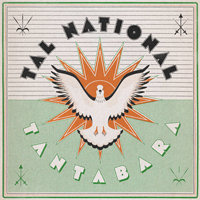
TAL NATIONAL
TANTABARA (Fat Cat)
If you turn the pot up on the talent -- more talented guitars (playing fast in unison), polyrhythmic pounding trap drums, talking drums, assured singing -- then Niger has something to boast about: in the form of Tal National, to me the outstanding band from this deserted corner of the Sahara desert. This is their third album on Fat Cat but, once again, I can't tell you more than song titles and repeat a few notes on bandcamp saying energy, spirit and intense emotion surround you. We also learn that different band members sing lead on each of the 8 tracks on here. They see themselves as a rock band, though rooted in tradition, while the guitarist Almeida is interested in "trance." But he is more a Bedouin Jeff Beck than another dopy desert Deadhead. It veers from hard rock to frantic quite often, so if you are ready for some blazing guitar pyrotechnics, crank it up.
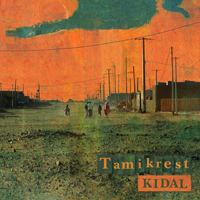
TAMIKREST
KIDAL (Glitterbeat)
I seem to have a block against some African music, like Touareg Blues and Ethiopian Jazz, not to mention AfroFunk-fusion, etc. So I forced myself to listen to Tamikrest's latest and my mind wandered. They reminded me of Donovan (whom I have not thought about in 50 years, since kids in school would ask Who is better, Bob Dylan or Donovan; then the follow up was Who is better Elvis or Cliff Richard? My answer was always the Who are better...). Another thought that came to mind was a bunch of guys strumming in open G tuning without any real purpose. They claim their influences are Pink Floyd, Rachid Taha and flamenco, so imagine that mashup to get an idea of the Tamikrest sound. After they warm up they get to a place where, if I were a stoner, I would think was pretty deep. Two tracks, "Atwitas" (a slow 12-bar blues with Cooderesque slide guitar and atmospherics on a third guitar) and "Ehad wad nadorhan," stand out as examples of laid-back smoke-wreathed jams, but then they go back to the skip-to-my-lou lyrical see-sawing which seems so simplistic as to be silly. The tracks I like have contrapuntal rhythms and the guitars trying out different effects (with lots of echo), as well as the odd sortie from an acoustic stringed instrument, perhaps an ngoni. Kidal is a town on the southwest edge of the Sahara desert, it sounds like the real Wild West: dust blowing along what passes for main street, no place to go unless you are ready to face miles of desolate wilderness. You sense that in the atmospherics of this uneasy dream.
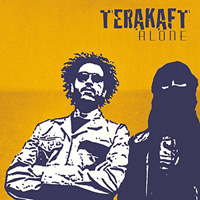
TERAKAFT
ALONE (TENERE) (OutHere OH28)
The Desert Blues played by Tuareg from Niger has turned into an Afrobeat-like fad. Every label has a band from Niger and, other than Bombino, they all sound alike to me. However I thought I had better listen to the new one from Terakaft because Mark Hudson, who knows his stuff, wrote in the Daily Telepath that "Terakaft's sound is the starkest and most compelling excursion yet into the sonic world of the Sahara." They are a splinter group from Tinariwen, their sound is pretty raw and has different rhythms on it, not just the repetitious washing machine thud and skirling guitars. It starts off with an old A-minor to E-minor vamp that lopes along with the lyrics "It is hard to remain without a camel, no water except in a deep hole." OK. The next song tells us, "Some are in the sun, some are in the shade." The vocals sound like a complaint, which would make sense if you were the one in the sun. One song ends another begins with a wiry lead guitar over the thrumming percussion. Track seven breaks out of the monotony a bit with an uptempo song about a "well-trained and nicely decorated camel." It sounds like country and western music. Justin Adams produced and adds bits of guitar and percussion. According to Wikipedia, Justin "is an English guitarist and composer who works in blues and African styles." He has played with Jah Wobble and Robert Plant, so it's safe to say he has not played with everyone from King Sunny Adé to Ali Farka Touré. I imagine if you saw Terakaft live and inhaled a lot of passive pot the repetition would be soothing, especially if the vocal mikes were turned down. Fans of "desert blues" guitar will gobble it up like stoneless dates.
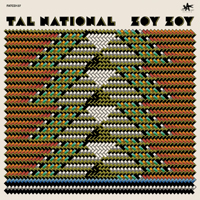
TAL NATIONAL
ZOY ZOY (FatCat FATCD137)
I was so excited in anticipation of the new Tal National CD that I ordered a copy instead of waiting for a promo to show up over the transom. It's brief, 45 mins or so, and to the point. They hit the sand running with three electric guitars battling it out over frantic percussion, foot-stomping bass, and yelling singers. Four drummers plus a talking drummer are credited. Other than that it's very basic, with two bass players and on this outing a guest keyboard player. Musically Niger is a mix of all the surrounding countries but is torn between its two biggest neighbors, Nigeria and Mali. While the north stretches off into mountains and the Sahara Desert, the capital, Niamey, on the Niger River, is close to Burkina Faso and Benin, so therein lies more clues to their unique sound: Amadou Ballaké, Gnonnas Pedro and the bands found on Samy Ben Redjeb's Bambara Mystic Soul compilation give us insight into the roots of this band. While it is intense you gradually begin to distinguish different guitar parts, and maybe discern two drummers going at it simultaneously. I don't know if these guys have any speed other than 78 rpm. It would be nice if they threw in a slow number but clearly they enjoy the frantic pace, the drummer clipclopping along with a head of steam, or setting up complex rhythmic interplay with the talking drum, and the guitarist weaving 16th-note filigree around the singers. It is melodic though they do seem to be shouting over the band, so are occasionally hoarse. It ends as abruptly as it began. Clearly they have a lot of music in them, but it would be interesting to hear some variety in their next outing.
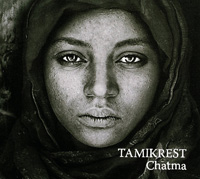
TAMIKREST
CHATMA (Glitterbeat)
The Kel Tamashek people have emerged from centuries of obscurity and desert wandering to be the darlings of the European concert scene, with their Grateful Dead-like dirges and jams. Their music is a measured, slow blues with stadium ponderousness on the trap drums, and loads of reverb and echo on the guitar, like they have been listening to Ry Cooder? Can it be he finally had an impact on African music? Not the Ali Farka tourism, but his slack key and slide guitar work on his own albums. Wherever it came from these are not indigenous guitar styles, but clearly influenced by Western probably American rock and blues musicians. It's more likely to be the Allman Brothers than Muddy Waters though. There's even a hint of "Marquee Moon" in here. Someone needs to find the lost cassettes that tourists left in West Africa and put out a roots of Kel Tamashek compilation! It would work well with this new album, Chatma, which means "Sister." It's an intriguing hybrid and there's lots of ideas at work in this, their third album. I particularly like it when they go into dub mode for an outtro, like on "Itous." "Assikal" reminds me of "Searching for Madge" by Fleetwood Mac, and it also has hints of Pink Floyd. (Since this is the second time I have been reminded of Fleetwood Mac this month I have resurrected their Men of the World album for another listen!) The production of Chatma is good and the overall execution is sophisticated, less raucous than other desert blues bands.

TARTIT WITH IMHARHAN
LIVE FROM THE SAHARA (Clermont Music)
I am afraid I am going to come off sounding like a dumb white guy here. I tried listening to this. It's live so you have to allow for the casualness of the recording, but why do some singers love to put the microphone into their mouth and then bellow? This is traditional music, lots of handclaps and thuds and ululating ladies in the background, so far so good, but then the woman singer, I guess it's Fadimata Walet, is really loud and keeps on with this refrain which is herka herka cerca shit, or just cerca shit, she does it over and over and it drives me bats. I am sure cerca shit means something in her language but to me it's freaky. This was recorded live during the Festival in the Desert 2012. The two groups here are Kel Tamasheq tribes people. Tartit means Union and they unify all strata of society with their music, played on the ngoni-like tehardent, the tinde (hand drum) and imzad (violin). The other group, who perform on three tracks, Imharhan, have electric guitars. I am sure if you were there in Timbuktu, under the stars laying in the warm sand, it would all be very magical, but to me it's a pass.
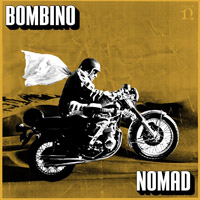
BOMBINO
NOMAD (Nonesuch)
Having seen Bombino in concert and knowing how dynamic his guitar playing is, I bought this on sight, and was not disappointed. Forget the comparisons to Hendrix (okay so he's an African with occasional big hair), etc and just enjoy this as four on the floor boogying rocking music. Perfect to blast in your jeep as you hightail it into the desert. Bombino (Omara Moctar) kicks it off with a skirling rip on the Big Joe Williams' "Baby please don't go" riff, and then the band kick it up a key to show they are paying attention. It's big, it's loud, it sounds like it's being played live in a huge stadium. The progressions are familiar: "Her Tenere (In the desert)" is based on the "House of the Rising Sun" progression which you feel at home with, but there's that Toureg edge to the vocals. The sidemen are mostly his regular group of rhythm, bass and drums with the odd guest thrown in here and there. Now we no longer have Lobi Traore to blister our ears with his incendiary guitar work we are grateful to Bombino for filling the "Dartagnan of the Desert" role so admirably. Towards the end of the 40 minute set they get more into a trance-mode, even adding synth strings, but mostly it's stirring and occasionally screeching blues. Even when a song starts out quietly, it's not long before they get into fifth gear and floor it. There are two drum kits at work simultaneously (shades of Lobi T. who used two bassists!) and a pedal steel guitar shows up, memorably, with its mournful plaint, for the second half of the set.

TAL NATIONAL
KAANI (Fatcat Records FATCD126)
Tal National come from Niamey, Niger. It's a huge, landlocked impoverished chunk in the middle of the northern lobe of West Africa. There's no infrastructure, not much of anything there, so the band spend their free time at roundabouts hawking their own CDs. Now that's enterprising. But I suspect their world is about to change. This is a storming great CD and bound to catapult them to the world festival circuit. In fact, since signing to FatCat records, they have embarked on a US tour. Their music is trance-inducing, with sustained guitar riffs repeated over thrashing percussion (including tama or talking drum), and it is pretty intense. It's essentially African rock (like Bombino) but draws from Highlife, Soukous, Afro funk, desert blues and some traditional ideas. They call it "trad-moderne." They spent six years practicing before releasing their first album and now their discs sell out at home immediately. They also play dusk to dawn concerts five night a week in Niamey so have some powerful chops after a dozen years of performing together. Like OK Jazz they are so popular they created a reserve band of musicians who can fulfill gigs, in essence a clone of themselves, this way, like a soccer team, they can send on subs when the main players are starting to flag. I am sure that's where they got the idea, because the founder, Almeida, used to play football. He was also a judge for 20 years before starting the band; now he teaches music and drama at an orphanage in Niamey in his free time. You can hear a cut from this album, "Wongharey" on soundcloud, and decide for yourself.
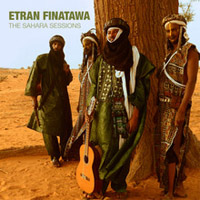
ETRAN FINATAWA
THE SAHARA SESSIONS (Riverboat TUG1071)
If you can keep your desert blues bands straight, you may be aware that Etran Finatawa is one of the more accomplished and diverse. Currently on tour to promote their latest album (I've lost count but it's possibly their sixth) which is released on Riverboat (a subsidiary of World Music Network, the London-based label, not the German one of the similar name). It's simple acoustic-guitar-based plaints with calabash drumming. The songs (which are not translated) are about the plight of the nomads of Niger: perhaps they should be called the still-mads since nothing much changes: their traditional way of life is constantly threatened although they live deep in the Sahara desert. The members come from Fula and Touareg tribes (traditionally rivals, but in the context of this band, good buddies) and during the recording session various passersby stopped to watch or join in with the hand-claps or spontaneously singing a traditional song. Three Touareg women from Niamey who had left the desert because of political unrest and poverty were coaxed back to the encampment to sing along to the tehardant, a traditional guitar-like instrument, and play tendé, which is a percussion instrument. The calabash here is played with sticks (instead of hands) and I have heard calabashes played in buckets of water to give them a bassy thwock. Also if the player is wearing rings it adds a sharp sting to the beat. You can hear the producer talking about the recording session on NPR. While the guitarist claims his influences are Jimi Hendrix and Carlos Santana, those are clearly just pipe dreams because he mainly strums. However there is a strong tribal feel to many of the songs: "Djojarere" and the fragment "Issuad," particularly, have a timeless quality to them with the wailing female vocals and a sense of animistic urgency, as if they are attempting to hold back the spirits of darkness through song.
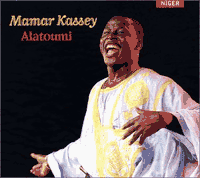
MAMAR KASSEY
ALATOUMI (World Village)
Mamar Kassey's ALATOUMI is one of the great discoveries of Modern African pop. From the line-up of instruments I expected it to be a folky affair, but never second-guess those West African bands. According to information in the liner notes for their first album, DENKÉ DENKÉ (released in 1998), the founder, Yacouba Mounmouni, was orphaned as a child of ten. He didn't get along with his brother and so he set off to walk the 200 km to Niamey, the capital of Niger. There he became houseboy to the sister of the former director of the National Ballet of Niger. With their encouragement, he studied dance and flute and was eventually (after seven years) admitted into the orchestra of the ballet. He met guitarist Abdoulaye Alhassane and they traveled the length of the river Niger collecting folk songs from villages en route. Eventually they poached some of the best musicians from the ballet troupe to form Mamar Kassey, named for a legendary Songhai warrior of the fifteenth century. The music is drawn from the folklore of West Africa and encompasses Songhai and Fulani poetry, sung in Hausa, Arabic, and French, for the most part. There is a melding of styles, so the raw rootsiness is counterbalanced with sophistication. They use traditional instruments with electric bass and guitar, but still the weight of the music is carried on the three-stringed molo (a lute ancestor), and the godje, a one-string fiddle with gourd resonator played with a bow. Mounmouni, as you might expect, is a master on the seyse flute, made from reeds of the river Niger. The two percussionists play douma (talking drum) and calabash (which is played with silver-ringed fingers!). From their founding in 1995 the band made a hit at the Atypical Nights of Koudougou Festival in Burkina Faso and went on to tour Mali and France, all the while building their repertoire. There's a churning groove reminiscent of some rock band jams (without the irritating predictability of C, F and G chord progressions); most of the tracks build to a trance that just locks in and grooves. Then the flute floats over the romping bassline. Now before you say, Wait, this sounds like Jethro Tull's THIS WAS, let me add that Mamar Kassey are more than a mere kick-out-the-jams band (though they smoke in concert). For starters, all the musicians are virtuosi. There's even a bass solo! (Harouna Abdou is an exceptional bassist.) But their particular genius is in a slow smoky build-up of passion till it's pure funk filling the air, while staying true to an in-the-bush sound. There's an arab flavor to the fiddle and a suggestion of the Wassoulou sound in the komsa (two-stringed lute), and molo (three-stringed lute, like the Bambara ngoni), played by Housseini Namata Chibkabou. The percussionists don't let anyone rest. It also sounds like it was recorded live, without overdubs. The handsomely packaged album tells us what each song is about (in French), from the arrival of the Peuls, through shepherd songs (Mounmouni's heritage as a lad), to songs about famine, orphans, falling in love with a girl who is already married, thieves that threaten the family, to a couple of rave-ups to end.
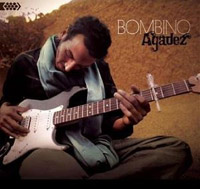
BOMBINO
AGADEZ (Cumbancha CD-20)
IN CONCERT AT MEZZANINE, SAN FRANCISCO, 9 DECEMBER 2011
One sign the recession is fading was the crowd in the new, trendy Mint Plaza in San Francisco's formerly seedy downtown, and a new club, Mezzanine, which was hosting Niger's guitar-wizard Bombino on Friday night. He is touring to promote Agadez, his new album on the Cumbancha label. After a terrible opening set from Matt Jennings (a talented guitarist with awful material who cannot sing), Bombino took the stage in his white Tuareg robes as whistles and ululations from the Africans present greeted him. I found a spot near the front with another grey-haired gent, this one wearing elaborate African regalia. My companion, Big Steve, who used to be a newspaperman in Oakland, told me he was a Black Panther who had fled to Africa and started a cooperative farm. Bombino looked pleased by the reception and started out on acoustic guitar with his percussionist playing calabash. He played "Tebsakh Dalet" and another ballad from his album Agadez, impressing us with his technical virtuosity. Then the percussionist switched to a drum kit and a rhythm guitar and bassist came on, while Bombino switched to his Stratocaster and turned on the reverb in his Fender Twin amplifier. The club is elegant and has great acoustics and pleasant ambiance plus stage lights with changing-color spotlights, but one unnecessary addition: a smoke machine. -- In San Francisco you just have to leave the back door open and the fog will come in. When the lights turned gold it looked like yellow cake uranium particles swirling overhead. The red-bearded bassist played about three notes all night: I think he was channeling the gimbri; the drummer was rock solid and created some great rhythmic patterns which Steve thought could have been heard in a disco in Tehran, or anywhere in the Arab world for that matter. The rhythm guitarist stayed in the background chopping out chords and sometimes giving a reggae-like backbeat chunk to the music, while the fifth member who was the "buddy" of the band, dressed in blue robes, a blue tagelmust, and a giant ornate leather amulet, thumped the calabash on the one and sang back-up. He was also the "translator," but Bombino only said a few words in French, mainly thank you, and I am moved by your appreciation. While he was enjoying himself he seemed very focussed and lost himself in ecstasy in his solos as the room heated up. There are suddenly lots of Tuareg bands on the concert circuit (no sooner had I slagged off Tinariwen than they were nominated for a Grammy!) but Bombino is something special. He is a truly gifted guitarist and if he continues to write material as solid as that on this album he has a great career ahead of him. After one ornate work-out, someone in the crowd yelled, "Jimi Hendrix says hi!" A mouth-harpist came on and blew some wailing blues harp which ignited Bombino during a long jam. They ended with their "hit" "Iyat Idounia Ayasahen (Another Life)."
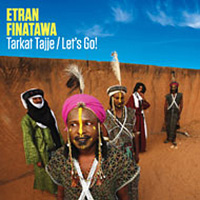
ETRAN FINATAWA
TARKAT TAJJE/LET'S GO! (Riverboat Records TUGCD1055)
Etran Finatawa is one of the better desert blues bands from West Africa. They combine Tourag musicians from Niger with members of the Wodaabe people (the ones who paint their faces). These are two of the eleven tribes that make up the people of Niger, one of the three poorest nations on the planet. Their name means "Stars of Tradition," so they draw from their roots but have a wide contemporary appeal. This, their third album, was recorded in the middle of their 2009 European tour; they have their act together, and are doubtless enjoying the change of scenery from sand dunes and camel herds to Autobahn rest stops and crowds of ecstatic white youth. Actually, come to think of it, I would prefer the former. Lyrically they have moved from wondering how nomads fit into modern society to broader concerns for humanity. The tunes are clipped and defined, with clear vocals and percussion, and move beyond the open-chord-strumming jam bands from the desert that are getting all the press. The album opens at sunset, which sets you up for an evening of storytelling and magic around the campfire. Track two, "Diam walla," addresses the big issue facing desert-dwellers: with global warming where are we going to get water? Their other concerns are universal: why can't we all get along? Let's celebrate our similarities rather than amplify our differences. By the middle of the album, Anivolla the guitarist take a break and we get a traditional Wodaabe song, usually sung by girls, about a handsome boy. The accompaniment is hand drums, clapping and calabashes being beaten by ringed fingers. The call-&-response vocals discuss the boy's long hair -- and long neck! There's also plenty of the spaced-out trance vibes, courtesy of their Fender guitar, to groove on, if that's your dime bag. There's an excellent half-hour video of them performing at Amoeba in LA here.
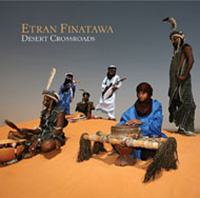
ETRAN FINATAWA
DESERT CROSSROADS (Riverboat TUG CD1048)
Timbuctoo used to be the most exotic place on earth, synonymous with the furthest from civilization you could get, but now the desert blues of Mali and Niger pops up everywhere. People you meet casually say they just got back from Mali or are planning a trip. And the A&R people are out there with their state-of-the-art laptop recording studios capturing the music while it's still fresh to our ears. But by now we recognise the instrumentation: the repetitive rub and drub drum patterns, pulsing bass, wailing chorus and bluesy guitar. Etran Finatawa has recorded before and returns with a strong set of original compositions. The group is comprised of people from two different nomadic tribes: the Tourag (the "blue people") and the Wodaabe. Their first album made it to the BBC World Music Awards shortlist in 2006 and they spent a year touring to promote it, and then in July 2007 went into the studio to record the songs they had written on the road about their desire to go back to Niger and their familiar lifestyle among the sun-baked dunes of the Sahara. The instruments are predominantly acoustic with occasional fuzztone guitar snaking in for a bit of grit in the musical egg salad. The songs are about their desire to preserve their culture. A nice slice of the desert zeitgeist.
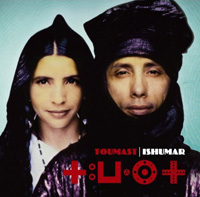
TOUMAST
ISHUMAR (RealWorld CDRW148)
More desert blues anyone? I know it's bad to compare and contrast as a way to write reviews but whereas Etran Finatawa have a clipped, acoustic blues sound, Toumast go for the electrified beat. "Ishumar" is a corruption of the French word for unemployed which is how the Tourags were viewed in Libya and Algeria when they were in exile from their desert homelands in the 70s and 80s. They didn't want to be part of Mali or Niger so took up arms. Band-leader, composer and guitarist Moussa Ag Keyna was wounded in the liberation struggle and recuperated in Paris where he met Dan Levy, the producer. Levy is all over this production, playing bass, drums, keyboard, sax and about a dozen other things as well as producing, so the album has a very different sound from the gritty Tinariwen or the folky Finatawa. As well as guitar there is djembe, played by Aminatou Goumar. RealWorld classifies it as being from Niger/France and it's about 50/50 desert blues and urban pop.

ETRAN FINATAWA
INTRODUCING ETRAN FINATAWA (World Network Intro105CD)
Fans of Tinariwen will snap this up. It's more of that droning insistent nomad jamming. There's the washing-machine thud of a big drum, hand claps, the occasional reedy gasba and some jangling guitar. I predict this will spark a new wave of hippie youth going off to ride the Marrakesh Express to the sandy wastes of West Africa. It is traditional music but the electric guitars give it a contemporary spark that makes its appeal international. The band comes from Niger and is comprised of four Tuareg and six Wodaabe musicians. (The Wodaabe are the ones who paint their faces.) The mix is good because the result is more flavourful than the generic Tuareg music. Many of the songs are grounded in nature and talk about sand dunes and camel races, but of course there's also the lovely young girl they call to come and dance. They also talk about trying to reconcile their nomadic lifestyle with the strictures of Islam when they sing about Anadjibo the herdsman who is trying to pray at the same time his cattle are running away.
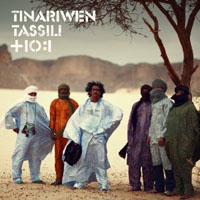
TINARIWEN
TASSILI +|0:| (Anti Records)
This band went from the remote Sahara desert to world music darlings overnight (well, in less than a decade). This is their fifth album and, despite the presence of several Western pop musicians to add some lustre, I can't tell it apart from their earlier albums. In fact I cannot tell one song from the next: they are mournful dirges that mostly follow the 12-bar blues format. It's not, as I said earlier, the Grateful Dead syndrome, because while the Dead would play the same songs over and over, within the framework of each they would explore new ideas, which is why the hardcore deadheads want 60 hours of "Casey Jones." There are scores of Desert blues bands now -- including Tinariwen, Tartit, Toumast, Tamikrest, Terakraft (I'm not making this up!), Takamba Super 11, Taliwen, Etran Finatawa -- so obviously Tinariwen have some appeal, but why didn't Lobi Traore get this kind of attention? Bombino with his one guitar is far more exciting on the same material. Is it simply marketing, connections and festival exposure? As for the added artists on here, I have no idea who Nels Cline is, or TV on the Radio and couldn't distinguish anything different about the jangly open-tuned endless G-chord tracks they are on, except for some wimpy white vocals. Maybe it's just the production that makes this album so bland. There is one track with the Dirty Dozen Brass Band which is very good, as the hornmen go outside and clearly have a good time throwing some Norlins grits into the stew. But for the most part, it's low key and too laid-back and the vocals don't appeal to me. Maybe if I smoked some weed I would appreciate it more, then again it might put me to sleep.